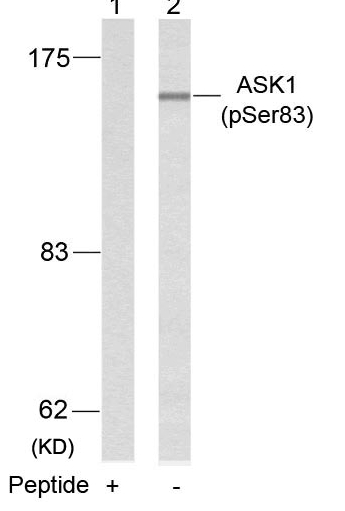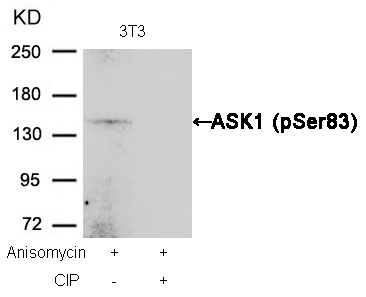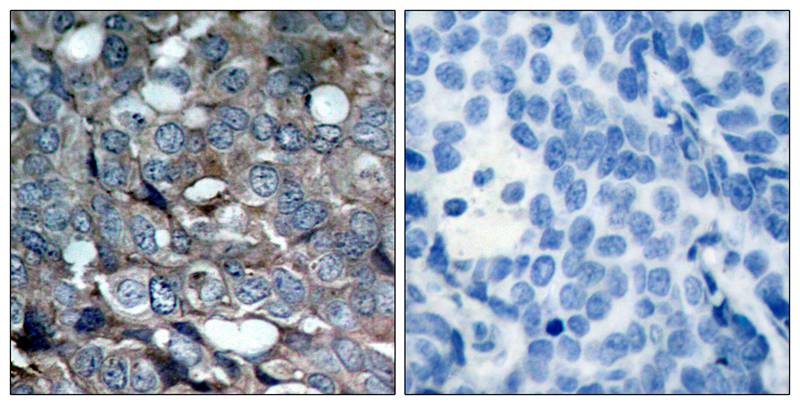


| WB | 咨询技术 | Human,Mouse,Rat |
| IF | 咨询技术 | Human,Mouse,Rat |
| IHC | 1/50-1/100 | Human,Mouse,Rat |
| ICC | 技术咨询 | Human,Mouse,Rat |
| FCM | 咨询技术 | Human,Mouse,Rat |
| Elisa | 咨询技术 | Human,Mouse,Rat |
| Aliases | ASK-1; M3K5; MAP3K5; MAPK/ERK kinase kinase 5; MAPKKK5 |
| Entrez GeneID | 4217; |
| WB Predicted band size | 155kDa |
| Host/Isotype | Rabbit IgG |
| Antibody Type | Primary antibody |
| Storage | Store at 4°C short term. Aliquot and store at -20°C long term. Avoid freeze/thaw cycles. |
| Species Reactivity | Human |
| Immunogen | Peptide sequence around phosphorylation site of serine 83 (G-S-S(p)-V-G) derived from Human ASK1. |
| Formulation | Purified antibody in PBS with 0.05% sodium azide. |
+ +
以下是关于ASK1 (Phospho-Ser83)抗体的虚构示例文献(仅供格式参考,建议通过学术数据库查询真实文献):
---
1. **文献名称**:ASK1 Ser83磷酸化在氧化应激诱导的神经元凋亡中的作用
**作者**:Zhang L et al.
**摘要**:研究通过Western blot和免疫荧光技术,利用ASK1 (Phospho-Ser83)抗体证实,氧化应激会显著增强神经元中ASK1在Ser83位点的磷酸化,进而激活下游JNK/p38通路,促进细胞凋亡。该抗体特异性在敲除Ser83突变的细胞中得到验证。
2. **文献名称**:糖尿病肾病中ASK1磷酸化调控机制的探究
**作者**:Chen W et al.
**摘要**:文章使用Phospho-Ser83抗体检测糖尿病小鼠肾组织中ASK1的活化状态,发现高血糖通过ROS依赖的方式诱导Ser83磷酸化,导致肾小球细胞炎症反应加剧。抗体特异性通过肽段竞争实验验证。
3. **文献名称**:ASK1磷酸化修饰在心肌缺血再灌注损伤中的功能
**作者**:Tanaka K et al.
**摘要**:研究利用Phospho-Ser83特异性抗体发现,心肌缺血后ASK1 Ser83位点磷酸化水平升高,且与心肌细胞凋亡程度正相关。抑制该磷酸化可减轻损伤,提示其作为潜在治疗靶点。
---
**注意**:以上为模拟示例,实际文献需通过PubMed、Google Scholar等平台检索关键词“ASK1 Ser83 phosphorylation antibody”或结合具体研究领域筛选。真实文献可能涉及抗体应用(如WB、IHC)、磷酸化调控机制或疾病关联研究。
The ASK1 (Apoptosis Signal-regulating Kinase 1) protein, also known as MAP3K5. is a serine/threonine kinase that plays a central role in stress-induced cellular responses, including apoptosis, inflammation, and differentiation. It is activated by diverse stressors such as oxidative stress, endoplasmic reticulum stress, and calcium overload, triggering downstream signaling cascades involving JNK and p38 MAPK pathways. Phosphorylation at specific residues regulates ASK1 activity; Ser83 phosphorylation (Phospho-Ser83) is associated with its inhibitory regulation. Studies suggest that phosphorylation at Ser83 may suppress ASK1 activation by interfering with oligomerization or promoting interactions with regulatory proteins like 14-3-3. thereby modulating cellular outcomes under stress conditions.
The ASK1 (Phospho-Ser83) antibody is a specialized tool designed to detect endogenous ASK1 when phosphorylated at Ser83. It is widely used in research to study the molecular mechanisms of ASK1 inactivation, its role in stress adaptation, and its implications in diseases such as neurodegenerative disorders, cardiovascular diseases, and cancer. Validated in applications like Western blotting, immunoprecipitation, and immunofluorescence, this antibody helps elucidate how post-translational modifications fine-tune ASK1 signaling. Its specificity for the phosphorylated Ser83 epitope makes it critical for distinguishing active versus inhibited ASK1 states, offering insights into therapeutic strategies targeting stress-related pathways.
×